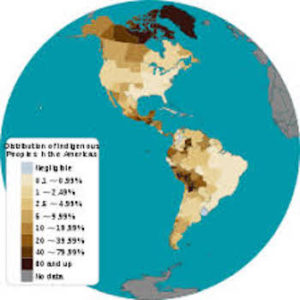
*On this date in c 1000 BCE, we affirm the Indigenous People of the Americas. The indigenous peoples of the Americas are the pre-Columbian societies of North, Central, and South America, the Caribbean, and their descendants. This international holiday is also called First People's Day, National Indigenous Peoples Day, Indian Day (Brazil), Columbus Day, or Native American Day.
Although some indigenous peoples of the Americas were traditionally hunter-gatherers, many, especially in the Amazon basin, still are, and many groups practice aquaculture and agriculture. Their agricultural endowment's impact on the world is a testament to their time and work in reshaping and cultivating indigenous vegetation in the Americas. Although some societies depended heavily on agriculture, others practiced farming, hunting, and gathering.
In some regions, the Indigenous peoples created epic architecture, large-scale organized cities, city-states, chiefdoms, states, kingdoms, and empires. Among these are the Aztec, Inca, and Maya states, which, until the 16th century, were among the world's most politically and socially advanced nations. They had a vast knowledge of engineering, architecture, mathematics, astronomy, writing, physics, medicine, planting and irrigation, geology, mining, sculpture, and goldsmithing.
The Native American name controversy relates to the dispute over acceptable ways to refer to the Indigenous peoples of the Americas and broad subsets thereof, such as those living in a specific country or sharing certain cultural attributes. Early settlers often adopted terms that some tribes used for each other, not realizing these were derogatory terms used by enemies. When discussing broader subsets of peoples, naming may be based on shared language, region, or historical relationship. Many English exonyms have been used to refer to the indigenous peoples of the Americas. Some of these names were based on foreign-language terms used by earlier white explorers and colonists. In contrast, others resulted from the colonists' attempts to translate or transliterate endonyms from the native languages. Other terms arose during periods of conflict between the whites and indigenous peoples.
The white Europeans brought only African slave men and women during the Middle Passage. They raped them and Taíno women, resulting in the first generation of “mestizo” mixed ancestry people. Since the late 20th century, indigenous peoples in the Americas have been more vocal about how they choose to be addressed, pushing to suppress the use of terms widely considered obsolete, inaccurate, or racist. During the latter half of the 20th century and the rise of the Indian rights movement, the United States government responded by proposing using the term "Native American" to recognize the importance of indigenous peoples' tenure in the nation. As may be expected among people of different cultures, not all Native Americans/American Indians agree on its use. All indigenous peoples have accepted no single group naming convention. Most prefer to be addressed as people of their tribe or nations when not speaking about Native Americans/American Indians.
Indigenous peoples still populate many parts of the Americas, especially Brazil, Argentina, Columbia, Bolivia, Canada, Ecuador, Guatemala, Mexico, Peru, and the United States. At least a thousand different indigenous languages are spoken in the Americas. Some, such as the Quechuan languages, Aymara, Guaraní, Mayan languages, and Nahuatl, count their speakers in millions. Many also maintain various aspects of indigenous cultural practices, including religion, social organization, and subsistence practices. Like most cultures, cultures specific to many indigenous peoples have evolved to incorporate traditional aspects and cater to modern needs. Some indigenous peoples live relatively isolated from Western culture, and a few are still counted as un-contacted.